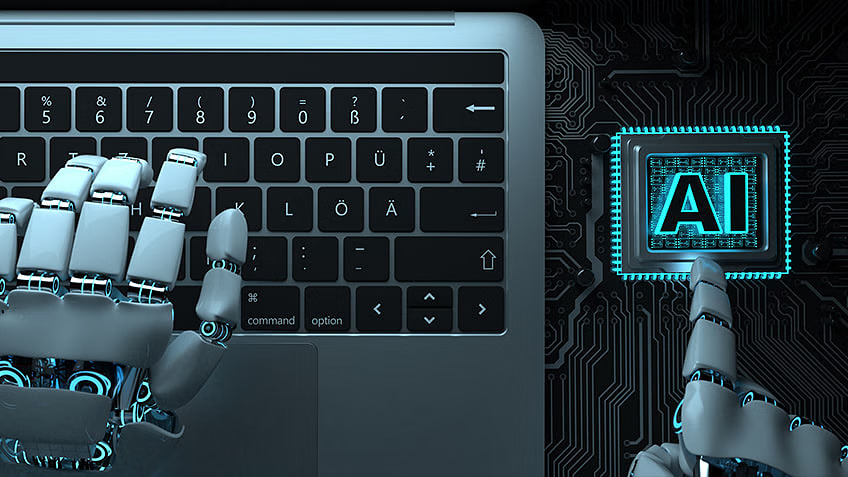Artificial intelligence is on everyone’s mind today, dominating the news cycle and transforming how we work, play, and conduct commerce. AI evangelists have been firing up our imaginations (and stoking our paranoia!) with examples of how artificial intelligence (and, by extension, machine learning) will be society’s big game-changer. But how specifically do we apply artificial intelligence today?
This article details the most common applications of artificial intelligence while defining the term and breaking down the various types of AI. And brace yourself; there are plenty of uses, and the number’s growing daily!
We’ll also share a way to get online AI/ML training that will help you gain practical experience in this exciting field.
So, before we launch into the applications of AI, let’s review what artificial intelligence is.
What is Artificial Intelligence?
Artificial Intelligence (AI) is machine-displayed intelligence that simulates human thinking or behavior. It can be trained to solve specific problems. AI is a fusion of machine learning and deep learning techniques. Types of Artificial Intelligence models are trained using vast volumes of data and can make intelligent decisions.
Additionally, artificial intelligence lets machines perform tasks typically associated with human intelligence, like learning, reasoning, and problem-solving. AI is a rapidly evolving field with many potential applications, such as healthcare, transportation, and customer service.
The Three Main Types of Artificial Intelligence
Artificial intelligence is commonly broken down into three over-arching categories.
- Artificial General Intelligence. Artificial general intelligence (or AGI for short) is also called strong AI or deep AI. AGI’s central premise is that machines equipped with general intelligence can learn and apply that intelligence to solve problems. In any context, AGI can theoretically think, comprehend, and behave indistinguishably from a human.
- Artificial Narrow Intelligence. ANI is the only type of artificial intelligence that we have effectively generated thus far. Often referred to as weak AI or narrow AI, it’s goal-oriented and designed to accomplish a single task like driving a car, facial recognition, speech recognition, voice assistants, or exploring the internet. It is highly competent at meeting its objectives.
- Artificial Super Intelligence. Artificial superintelligence (or ASI) is a hypothetical AI that goes beyond mimicking or understanding human intelligence and behavior. ASI is self-aware and exceeds human intelligence and ability. No, we’re definitely not there yet!
Now, let’s dive into the myriad applications of artificial intelligence.
The Many Applications of Artificial Intelligence
While the possibilities are limitless, here are some of the top applications of AI we see today.
- Automotive. Some automotive manufacturers are already using AI to provide virtual assistance to their users for better performance. Some companies, such as Google, are currently working to perfect self-driven cars.
- Chatbots. Artificial intelligence chatbots are programmed to understand natural language and reply to users using live chat customer care options. Machine learning helps drive and improve AI chatbots and is often incorporated into many websites and applications. Instead of gathering data from a set collection of replies, AI chatbots can independently construct a database of responses and add to it over time. These chatbots successfully address customer issues, reply to basic inquiries, improve customer service, and offer 24/7 help, increasing customer satisfaction.
- Data Security. Hackers and cybercriminals are everywhere, and cyber-attacks are increasing in the digital world. So, data security is vital for every company today and can make the difference between business continuation and complete failure. AI can make data safer and more secure, utilizing tools like AEG bot and AI2 Platform, which can spot software bugs and cyber-attacks more effectively.
- E-commerce. AI provides a competitive edge to e-commerce, and as a result, it’s becoming more in demand for today’s businesses. For example, this application of AI helps shoppers by referring products related to their initial purchase, including recommended sizes, colors, or brands. If, soon after making a purchase online, you’ve ever seen a pop-up saying, “Because you purchased (this product), you may like these products too!” or words to that extent, congratulations, you’ve had an encounter with AI! AI is also great for fraud detection and NLP-equipped personal shopping assistants.
- Education. AI can grade tests automatically, freeing the teacher to spend more time teaching. Additionally, AI-driven chatbots can interact with students as virtual teaching assistants. In the future, we may see AI being used as a personal virtual tutor for students, easily accessible at any time and place.
- Entertainment. We use AI-based applications daily for entertainment services such as Netflix or Amazon. These services show us recommendations for programs or shows we like, using ML/AI algorithms to do the work.
- Facial Recognition. Facial recognition maps and stores a user’s facial characteristics as a face print. The application of AI uses deep learning techniques to compare a live image to the stored facial print to validate the user’s identification. Facial recognition technology relies on image processing and machine learning to do the job. Facial recognition is used in airports, criminal detection, face tracking, forensics, etc. Face biometrics are potentially less intrusive than other biometric scans, such as fingerprints, palm prints, irises, etc., since facial recognition is more passive.
- Finance. Artificial intelligence and the financial world are a perfect match. The finance industry is already implementing adaptive intelligence, algorithm trading, automation, chatbot, and machine learning into their processes. This application of artificial intelligence can also detect fraud, manage risks, and advise investors.
- Gaming . Who doesn’t enjoy an exciting game? Unsurprisingly, AI is being used in the gaming industry. Gamers can play multiplayer games with AI-driven opponents who can learn and react to player moves. This type of gaming goes beyond just playing chess; we’re talking about sprawling, 4X multiplayer online strategy games.
- Healthcare. Over the past decade, AI has made beneficial inroads into the healthcare industry and stands to have an even more significant impact on the industry. Healthcare organizations are applying artificial intelligence techniques to make better and faster diagnoses than human physicians can. Additionally, AI can help doctors with their diagnoses and warn them when their patients’ conditions are deteriorating so medical help can be dispatched to the patient before they require hospitalization. AI can even perform robotic surgery, working with exacting precision without tiring. Additionally, AI plays a part in developing new drugs and treatments.
- Marketing. Artificial intelligence applications are also widely used in marketing, making automated decisions based on analysis, data collection, and subsequent observations of the audience or influential economic patterns that may affect marketing campaigns. AI is typically used in marketing campaigns where speed and efficiency are paramount. AI systems use data and customer profiles to learn how to engage with customers effectively and then send them personalized messages at the optimal time without requiring the marketing team to do anything. Here are some specific instances where artificial intelligence is used in marketing:
- Marketers can use behavioral analysis, pattern recognition, and other AI tools to deliver highly targeted and personalized ads to potential customers. AI also helps retarget viewers at the right time, ensuring better outcomes, greater engagement, and lead conversions and reducing customer distrust and frustration.
- Apps like Gmail and Google Docs use AI in Smart Compose to read what you’re typing, understand it, and suggest what to type next. This process is called “predictive text.”
- Artificial intelligence collects and tracks real-time tactical data, enabling marketers to make immediate decisions rather than waiting until the campaign ends. As a result, marketers can decide what to do next based on accurate data-driven reports, resulting in better and more objective decisions.
- Robotics. Artificial Intelligence contributes heavily to the field of robotics. Typically, basic robots are programmed so they can perform repetitive tasks. However, with the help of AI, engineers can create intelligent robots and machines that can perform elaborate and complex tasks based on their own experiences and without human intervention.
- Social Media. Social media sites like Facebook, Snapchat, TikTok, and Twitter have billions of user profiles, which must be stored and managed efficiently. AI organizes and manages massive amounts of data and can analyze this data to identify the latest trends, hashtags, and the many requirements of vastly different groups of users.
- Travel and Transportation. Artificial intelligence can perform many travel-related tasks, such as making travel arrangements and suggesting accommodations, flights, and the best tours. Travel industries are already using AI-powered chatbots, which offer customers human-like interactions for faster, more effective responses.
Is Artificial Intelligence Inhibiting Human Progress?
Despite its ubiquity and the host of clickbait-worthy, panicky stories about it supplanting humans, the applications of artificial intelligence still lag far behind the capacities and flexibility of the human brain. Artificial intelligence still has a long way to go in areas like natural language processing, creativity, understanding subtleties, and problem-solving before it can even remotely be considered a threat, existential or otherwise, to human potential.
So no, don’t pencil “robot revolution” into your calendar yet!
But if you want to join the AI revolution and the many applications of AI, read on.
Do You Want a Greater Understanding of Artificial Intelligence and Machine Learning?
This AI ML bootcamp consists of six months of intense, applied learning that teaches valuable skills in statistics, applied Python programming, machine learning algorithms, ensemble and deep learning, large language models, generative AI, prompt engineering, and other valuable AI and ML-related skills.
The job site Glassdoor.com reports that artificial intelligence engineers in the U.S. can potentially earn a yearly average salary of $126,994. So, get ready to take your rightful place in the AI/ML revolution by equipping yourself with the skills to create a meaningful, secure career in this hot technological advance!







